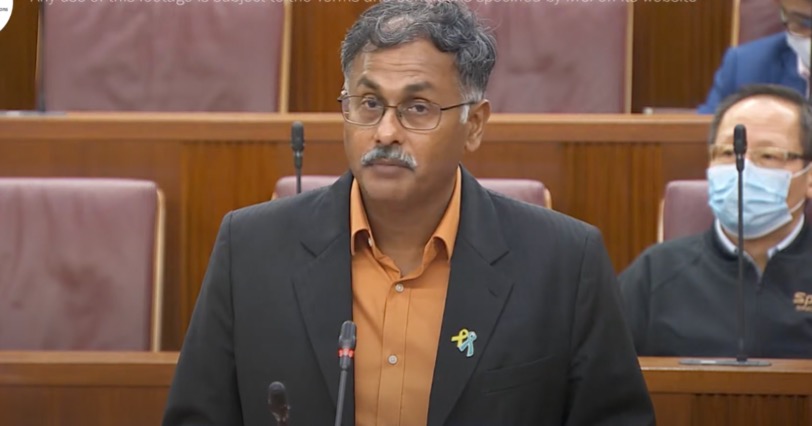Member of Parliament (MP) Murali Pillai made an interesting adjournment motion on the floor of Parliament House on March 4.
He and his fellow MPs had been engaged in a marathon round of Budget and Committee of Supply debates for almost two weeks, starting early in the morning and ending late at night.
Every speech seemed to start with some variation of "Covid-19 has changed the world" and every speech seemed to end on the same theme of "emerging stronger" -- which just happens to be the name of Deputy Prime Minister Heng Swee Keat's budget.
In other words, bread-and-butter issues dominated the proceedings, with discussions on how Singaporeans could weather the crisis, and how the government was both boosting the economy and protecting the environment.
Murali introduces adjournment motion on rule of law and judicial review
So it came as a surprise when the Bukit Batok MP stood up to touch upon, of all things, the Internal Security Act (ISA) in an adjournment motion.
Murali is the son of the late P.K. Pillai, a unionist who was detained without trial under Operation Coldstore.
And perhaps the bigger surprise was that while he spoke of its continued necessity, he also added a call to increase accountability and transparency of statutes that expressly restrict or exclude judicial review, which he called "ouster clauses".
He called for the parliament to regularly conduct a review of these clauses against current circumstances to ensure there continues to be a need for such exceptions to exist.
Singapore public trust in legitimacy of government and law, which helped during Covid-19 crisis
But even Murali couldn't resist a reference to Covid-19, however.
He made the point that unlike some people in other countries, Singaporeans mostly obeyed laws that were designed to safeguard public safety.
He added that this worked not just because the state enforces the laws, but the vast majority of Singaporeans accept the legitimacy of the law and the authority of the country's institutions.
Murali said, "Singapore is doing reasonably well in the pandemic precisely because people perceive and support the laws as legitimate and being fairly enforced."
However, he feels that Parliament, as elected representatives of the people, should conduct regular scrutiny of these ouster clauses so as to uphold that legitimacy.
ISA necessary: Murali Pillai
If anyone was thinking that Murali opposed the ISA, they would be mistaken.
He noted the ISA's importance in ensuring stability and security against threats like terrorism, espionage and organised violence.
Murali also cited a 1989 speech by then-Home Affairs Minister S Jayakumar that pointed out that subjecting the ISA to court scrutiny would be tantamount to giving the court the final say on national security matters, which Murali said is not desirable.
In lieu of court scrutiny, there are certain checks and balances, such as the involvement of an Advisory body and the President, an elected position. Murali added, "In short, the ISA does not operate in darkness."
Also, there are other Acts not subject to court scrutiny either, such as the Charities, Immigration and Employment of Foreign Manpower Acts.
Singaporeans want checks and balances
So if there are such Acts, what does Murali feel should be done to improve things?
While he recognises there are some areas where the Executive branch needs to act "quickly and efficiently", he also feels it is important that such powers must not be abused.
This is consistent with the desire of Singaporeans to have checks and balances, which Prime Minister Lee Hsien Loong mentioned in his Ordinary Party Conference speech in Nov. 2020.
He also points out that over time, the use of ouster clauses may be different from what was originally envisioned. For example, the Employment of Foreign Manpower Act is used today to penalise companies who breach the law.
Murali supports it in this particular instance, but said that it would be appropriate for Parliament to consider whether the law should be extended to cover new circumstances.
Time for a review?
He said he is not convinced by the "utility argument" advanced in Parliament to justify ouster clauses, namely, that entities subjected to such clauses would abuse court processes to drag out a review and hold up executive action.
Murali said that can happen even now in certain circumstances, and the court system is well-equipped to deal with people abusing its processes, including sanctioning the party and their legal representation.
Also, Murali pointed to a Supreme Court decision in 2019 that, while not deciding on the validity of ouster clauses, furthered debate on the matter. He added:
"I accept that the court in Nagaenthran did not decide on the validity of any ouster clause. However, given the reasoning of the court, this may be an opportune time for the government to review its position on ouster clauses in the name of good governance and the rule of law."
Sunlight of scrutiny
Summing up his speech, Murali said that he recognised the need for the Executive to act speedily and flexibly in certain situations, given Singapore's vulnerabilities.
However, he intends a review to address Singaporeans' desire for checks on its power, for statutes not dealing with national security.
This would be in the interest of the rule of law, which is not an end in itself, but a requirement for building a better society.
Murali said, "Ultimately, I believe that ensuring the sunlight of scrutiny on Executive action, be it by the court or another high office will strengthen the legitimacy of our laws," adding that the public could rely on its authoritative findings instead of "armchair critics on social media."
Top image from MCI's YouTube channel.
If you like what you read, follow us on Facebook, Instagram, Twitter and Telegram to get the latest updates.
